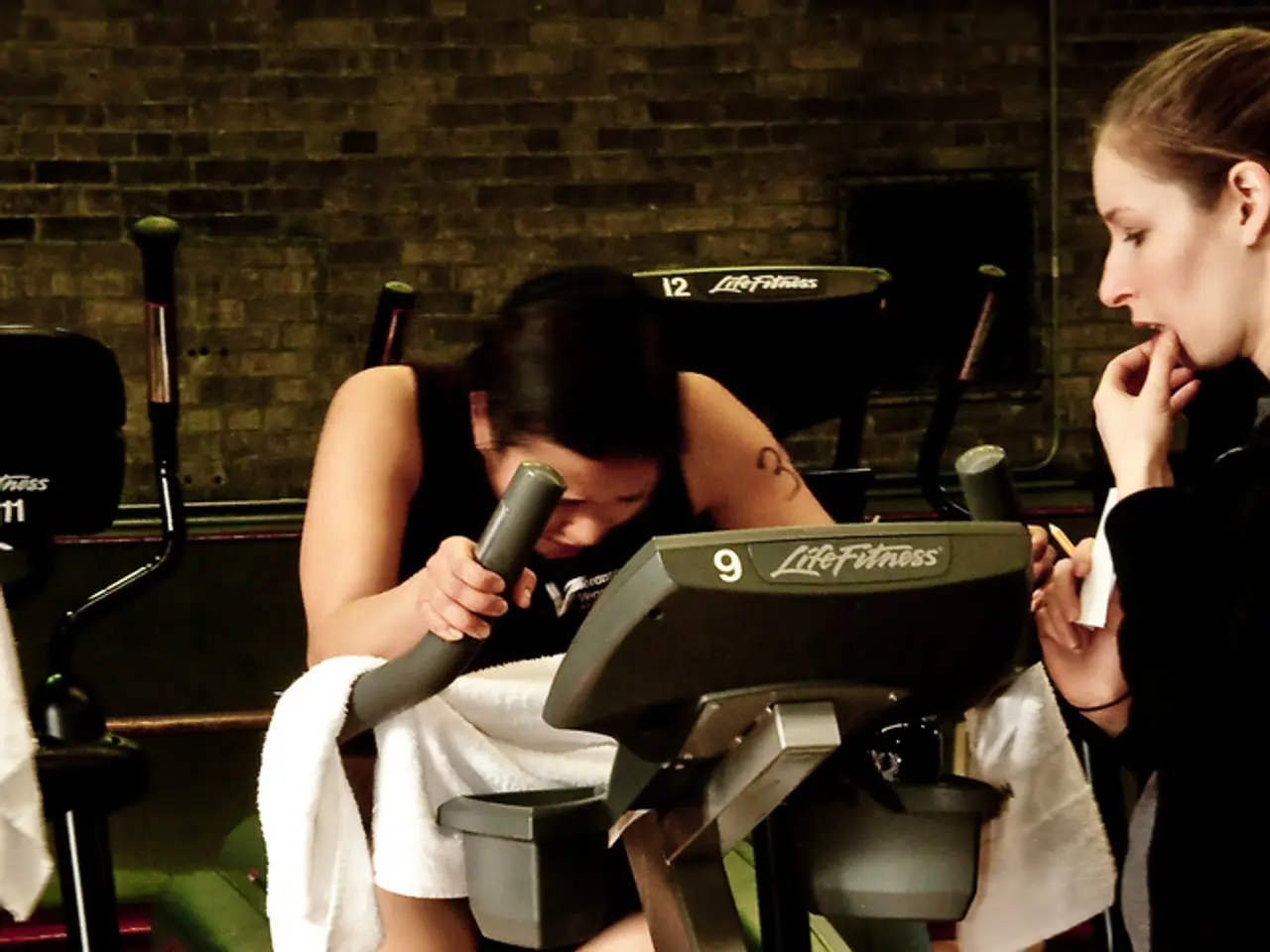Boosting Fitness during Menopause: Enhancing Health and Vigor
Menopause, a natural transition in a woman's life, brings about significant bodily changes. To alleviate symptoms and improve overall health, women are recommended to follow a balanced exercise routine that includes aerobic, resistance, and flexibility/balance exercises.
Aerobic exercises, such as brisk walking, cycling, swimming, jogging, or running, are essential for women in menopause. These activities improve cardiovascular health, increase endurance, and help regulate body temperature, which can be particularly beneficial in managing hot flashes and night sweats. The Centers for Disease Control and Prevention (CDC) recommend at least 150 minutes of moderate-intensity aerobic exercise per week, which can be split into 30-minute sessions, five times a week.
Resistance exercises, including weightlifting, bodyweight exercises like push-ups, squats, and lunges, and resistance band workouts, are important for maintaining muscle mass, bone density, and metabolic rate. The recommendation is to engage in 2 to 3 strength training sessions per week, targeting all major muscle groups. Strength training has been linked to reduced risk of osteoporosis and cardiovascular mortality.
Flexibility and balance exercises, such as yoga, Pilates, tai chi, and stretching exercises, improve flexibility, balance, coordination, and functional ability, reducing fall risk and injury. Yoga is also beneficial for managing stress, improving sleep, and easing menopausal symptoms like anxiety and urogenital issues. These exercises should ideally be incorporated 2 to 3 times per week.
A well-rounded weekly routine for menopausal women might look like this:
| Exercise Type | Frequency | Benefits | |-----------------------|----------------------------------|-------------------------------------------| | Aerobic (e.g., walking, cycling) | 150 minutes per week (e.g., 30 min, 5x/week) | Cardiovascular health, symptom reduction | | Resistance training (e.g., weights, bodyweight) | 2-3 times per week | Muscle mass, bone density, metabolism | | Flexibility & balance (e.g., yoga, Pilates) | 2-3 times per week | Flexibility, balance, stress reduction |
This integrated approach supports cardiovascular health, bone strength, metabolic function, and symptom management during menopause.
Walking is a simple, accessible modality that can be done daily for cardiovascular and bone health. Consistency in exercising is crucial for noticeable benefits in symptom relief and overall wellness during menopause. Choosing activities that are enjoyable and fit the lifestyle is crucial for sticking to an exercise routine. Incorporating a variety of exercises into the daily routine helps prevent boredom and provides a well-rounded fitness program.
Balancing exercises, like yoga and tai chi, can help improve stability and reduce the risk of falls during menopause. Drinking plenty of water before, during, and after exercise is crucial for staying hydrated. It's important to listen to the body during exercise, making adjustments as needed to prevent injuries.
During menopause, a decline in reproductive hormones like estrogen occurs, which can lead to a decrease in metabolism, making it more challenging to maintain or lose weight. The body may store fat more easily and metabolize carbohydrates and fats less efficiently during menopause. Regular exercise is crucial for overall health and well-being during menopause.
Setting realistic and achievable goals is key to staying motivated during an exercise program. Mind-body exercises like deep breathing, meditation, and yoga can reduce stress, improve sleep quality, and promote a sense of calm and well-being during menopause. Starting a workout program during menopause can be challenging, but consulting a doctor before starting is important, especially if there are health issues or concerns.
In summary, embracing exercise during menopause can lead to significant improvements in overall health and well-being. A balanced exercise routine that includes aerobic, resistance, and flexibility/balance exercises is recommended for women in menopause to alleviate symptoms, manage weight, improve bone health, increase muscle strength, and promote overall well-being.
- Science and fitness-and-exercise research emphasize the importance of incorporating aerobic exercises in a woman's menopause routine, as these activities can improve health, boost endurance, and aid in symptom management, particularly for hot flashes and night sweats.
- In addition to aerobic exercises, resistance training, such as weightlifting, bodyweight exercises, and resistance band workouts, are valuable for women in menopause, as they help maintain muscle mass, bone density, and metabolic rate, which can reduce the risk of osteoporosis and cardiovascular mortality.
- Lastly, women in menopause are advised to focus on flexibility and balance exercises, like yoga, Pilates, tai chi, and stretching, to improve their overall functional ability, reduce the risk of falls, manage stress, and ease menopausal symptoms such as anxiety and urogenital issues.




